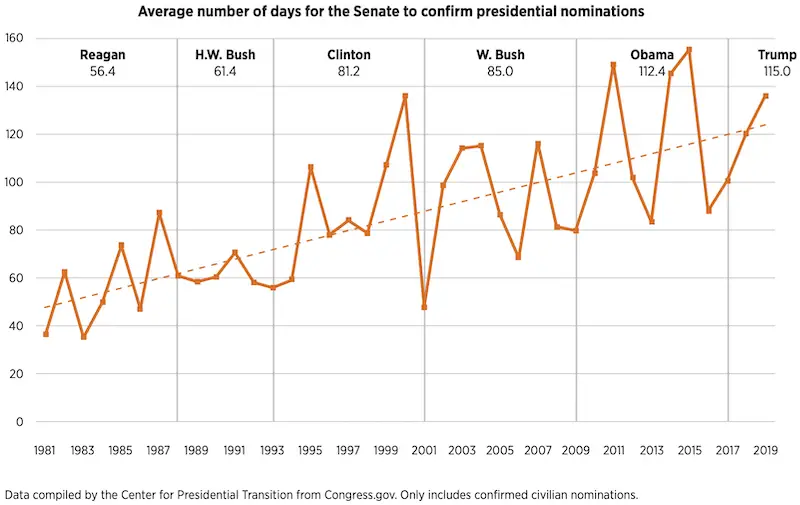A new study from the political appointees now takes twice as long today as it did during the Reagan administration.
The study analyzed the period between a formal nomination and Senate confirmation. According to the results, the average Senate confirmation process for presidential appointments takes 115 days under the Trump administration versus 56.4 days during the Reagan administration, and the total length of time has been steadily increasing since the 1980s during each subsequent administration. The chart below shows the overall trend.
The length of time is even worse for sub-cabinet roles according to the study’s findings. During the Obama administration and the Trump administration to date, it took nominees for these jobs about 3.5 times as long to be confirmed as nominees for Cabinet positions, 115.3 days compared with 30.9 days.
The study also found that one party’s control of government did not have an impact in the length of time for confirmations. When the same party was in the White House and the Senate, the average length of time was 83.3 days compared to 81.2 days for different parties.
The study blames a cumbersome “advise and consent” process in the Senate for the delays, noting, “The confirmation process has become more cumbersome over time because the Senate’s responsibility to ‘advise and consent’ takes far longer now than it did in previous years.”
How can the process be improved? The Partnership for Public Service made these recommendations:
- Presidential transition teams should identify and select well-qualified candidates for Senate-confirmed positions before the presidential election.
- The Senate should reduce the number of presidential appointments subject to Senate confirmation.
- All officials should work to change the presumption that well-qualified appointees serving in management positions will be replaced when there is a change in administration.
- Congress and the executive branch should simplify paperwork to reduce the burden on nominees.
- Congress and the incumbent administration should ensure the FBI, Office of Government Ethics and relevant agencies are prepared for a surge in nominations in the first and fifth years of a presidency.
- The administration and nominees should submit timely, accurate and complete paperwork to the Senate to minimize the delay caused by revisions.
- The Senate should reexamine the “privileged calendar” to expedite noncontroversial nominations.
- The legislative and executive branches should work across party lines to ensure the most important Senate- confirmed positions are filled in the first 100 days of a first or second term.
The full study results are included below.
Senate Confirmation Process Slows to a Crawl



